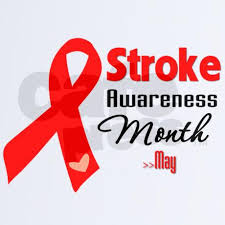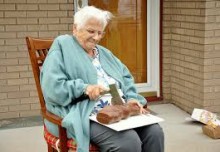 Every 39 seconds someone in the United States will suffer a stroke, and about three of every four of these people will be 65 years of age or older. Since May is Stroke Awareness Month, it is a reminder of how important it is that you can quickly recognize the signs of possible stroke. Time is a critical factor because the onset of stroke is always sudden and the window of opportunity to address the severity and permanence of the stroke’s effects is very small. Yet, stroke is the fourth leading cause of death for adults in the United States and one of the leading causes of disability.
Every 39 seconds someone in the United States will suffer a stroke, and about three of every four of these people will be 65 years of age or older. Since May is Stroke Awareness Month, it is a reminder of how important it is that you can quickly recognize the signs of possible stroke. Time is a critical factor because the onset of stroke is always sudden and the window of opportunity to address the severity and permanence of the stroke’s effects is very small. Yet, stroke is the fourth leading cause of death for adults in the United States and one of the leading causes of disability.
The best thing you can do if you are a caregiver for an older adult is get them to emergency care as soon as possible after the first signs of a stroke. And, of course, the best way to be able to do that is to be able to recognize the warning signs of the onset of a stroke. There are five signs of stroke all caregivers should know, but research has shown that only about one in three adults recognizes even one of the signs. All of the signs share one thing in common; they are sudden. If you see the sudden onset of any of these, you need to call 911:
- a dramatic headache that seems to come out of nowhere, especially in someone not prone to headaches;
- dizziness or a loss of balance or coordination;
- difficulty in word formation or an incoherence or confusion in speech patterns;
- a numbness on one side or the other; this may be in the face or limbs or it can be an entire hemisphere of the body;
- difficulty in focusing one or both of the eyes.
The reason that it is important to get immediate attention is important to get immediate medical attention is because medical providers must be able to assess the cause of the stroke in order to offer effective treatment. In embolic strokes, the stroke itself is caused by a blood clot. There are different forms of blood clots, but treatment will be built around dissolving the close. In hemorrhagic strokes, a blood vessel commonly has burst resulting in a leak causing the resultant stroke.
Perhaps even more important than understanding the warning signs of a stroke after it occurs is preventing one in the first place. If you are a caregiver, help you loved one to eliminate risk factors like smoking, excessive alcohol consumption, high blood pressure or high cholesterol. They should also manage their weight or diabetes or heart disease if they have these conditions. SO, you can be not just a caregiver; you can be a life saver!
Charlotte Bishop is a Geriatric Care Manager and founder of Creative Care Management, certified professionals who are geriatric advocates, resources, counselors and friends to older adults and their families in metropolitan Chicago. Please email your questions to info@cr eativecaremanagement.com.





